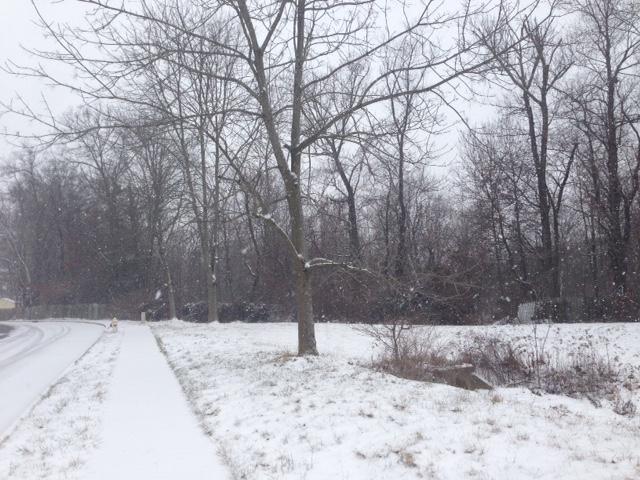Snow way we’ll have school tomorrow!
A look at the inner-workings of two hour delays and school closings with NPSD Superintendent Dr. Curt Dietrich
Tough Call: Snow amounts like that shown here often pose tricky situations for school districts when it comes to making a decision on opening on time. The NPSD has a detailed evaluation process for deciding whether or not the snow and ice warrants a delay or closing.
LANSDALE – For many students, nothing beats being greeted in the morning by a blanket of snow covering the ground- particularly if it is a school day. Instantly, many check the school webpage in search for the red-lettered announcement of a two hour delay or school closure. Sometimes, however, the announcement does not appear-regardless of how many times the webpage is refreshed. The disappointing reality sinks in. Because many students have dealt with disappointment and sleep deprivation, in addition to weather conditions, complaints are inevitably made throughout the school day. Students tend to point their fingers at the man who makes the decisions regarding weather-related emergencies, superintendent Dr. Curtis Dietrich. However, making a decision for a school district that encompasses an area of 42 square miles and consists of 13 elementary schools, three middle schools, one high school, and one alternative school is more complicated than it seems.
“I don’t sleep well the night before I have to make a decision,” Dietrich said.
When weather-related issues are anticipated, he monitors various weather reports from multiple sources hourly the night before, hopefully getting some sleep. At 4:30 AM, Dietrich again checks weather reports, paying particular attention to temperature, ice, snowfall, and freezing rain. Meanwhile, school sidewalks, parking lots, and buses are being cleared of snow.
Throughout the morning, Dietrich consults with a team of individuals who drive around and scope out different areas of the district, checking to see whether or not the snow on sidewalks and roads are cleared off. If sidewalks and back roads are still covered in snow, factors such as slipperiness and the depth of snow covering the ground are taken into consideration. He also talks with groundskeepers to make sure parking lots are able to be cleared.
“It can be frustrating,” Dietrich said. “There are lots of areas to consider… conditions can vary from road to road.”
At 5:00 AM, he engages in a conference call with neighboring school districts. Sometimes, neighboring school districts have two-hour delays or close when NPSD does not. Although discrepancies oftentimes frustrate students, Dietrich makes the decision with careful consideration.
“The conditions vary. Some districts have more hills or back roads. There also may be less equipment and staff to deal with snow removal,” Dietrich said.
The discrepancy between two-hour delays and school closures in school districts can cause the Tech School, which is next to NPHS, to have a two-hour delay or day off even when NPSD schools are open. This is because the Tech School stays open only when 50% of students are expected to show up. Because NPSD makes up 43% of the total amount of attending students, the Tech School may not be open if other schools have two hour delays or school closures.
Because conditions can vary from district to district, it would not make sense for NPSD to have to make up missed hours for PA’s 990 hour requirement of instructional time (which does not include lunch or time in between periods) when it is not necessary to do so.
Ultimately, Dietrich must decide whether or not roads and sidewalks of the majority of the district are safe for travel.
“It’s hard because it’s so early in the morning,” Dietrich said. “It doesn’t always go the way you think it will.”
There are many issues that may arise during weather conditions. A snowplow can break, unexpected equipment issues can arise, or an accident can cause traffic and delays. Throughout the morning, Dietrich listens to the two-way radio of the Transportation department and the Facility Department to make sure that no issues arise. After explaining that bus drivers who are able to operate a bus can operate in many weather related conditions, Dietrich expressed confidence in NPSD’s bus drivers.
“I am so impressed with our drivers. They communicate very well with each other… they help one another,” Dietrich said.
Dietrich advised students who feel unsafe behind the wheel during any weather condition to go on the bus or find a ride.
“I’d rather they don’t come than get in an accident,” Dietrich explained.
Inevitably, Dietrich receives many complaints after making a decision that others do not agree with. As road conditions can vary from road to road, opinions on two-hour delays, closures, and early dismissals often vary from person to person. Nevertheless, Dietrich listens to the complaints of others and takes them seriously.
“It’s part of the job,” Dietrich said. “It’s important to be a good listener.”
He receives the most complaints from parents of elementary school aged children. Parents have a difficult time adjusting plans, finding daycare when necessary, and often end up being late to work.
“I get a lot of complaints from parents who are frustrated with a two hour delay when they don’t think it was necessary and vise versa,” Dietrich said.
Dietrich noted that, after explaining his decision, parents are usually less frustrated.
“I understand people’s’ lives are complicated, but safety goes first,” Dietrich said. “Student safety is extremely important to me.”


